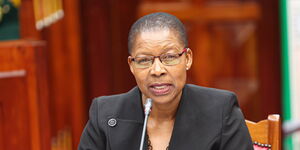Governors-elect and their deputies taking the oath of office will be expected to sign and commit to Integrity Codes before assuming office.
Kenyans, for the first time, will witness their forty-five newly elected governors take an integrity oath on Thursday, August 25.
The Ethics and Anti-Corruption Commission (EACC) adopted the codes to hold the leaders accountable and curb graft cases witnessed in the previous administrations.
Reports indicated that the anti-graft agency posted its officers across the country to witness the exercise.
The integrity code is meant to bind the leaders to uphold high standards of integrity and refrain from rampant corruption that has dogged county governments.
EACC stated that the documents will be signed in the presence of Judicial Officers and EACC officials who will be present in all swearing-in ceremonies to witness.
“As part of preventing corruption in the incoming governments, all governors and deputies taking the oath of office today will at the same time sign and commit to Integrity Codes in the presence of Judicial Officers,” EACC boss Twalib Mbarak stated.
Twalib explained that the signing of the Integrity Code represents a commitment and pledge by the State Officer that as they discharge their duties to the public, they will uphold the integrity and not betray the public trust.
The Code is under Part II of the Leadership and Integrity Act, 2012.
Sections 26 and 27 of the Public Officer Ethics Act, 2003 require all public officials to declare their wealth within 30 days of assuming office.
In 2019, the EACC made it mandatory for governors and their spouses to declare their income, assets and liabilities for a lifestyle audit.
EACC Chairman, Eliud Wabukala, explained that the senior officers employed by the county public service boards will also be subjected to the audit as a new measure to fight corruption.
The Rtd. Archbishop noted that 2019 was a “declaration year” and all public officials will be required to submit their biennial declarations together with those of their spouses and children under the age of 18.












